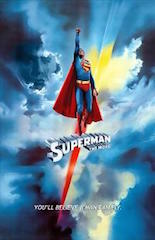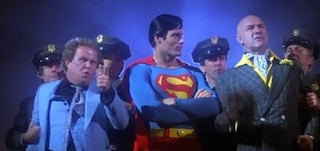 Even as a lifelong, avid fan of Superman and, therefore, an admittedly biased interpreter of all things related to the Man of Steel, I have no problem admitting that Richard Donner’s 1978 flick is a movie that shouldn’t work. The narrative of Superman is essentially a series of three extended vignettes into different periods of the titular hero’s life: childhood on his home planet, boyhood and adolescence in Kansas, and superhero-hood in Metropolis. The problem, however, is that there is very little narrative glue in this film to hold the pieces together. Moreover, Superman overstays its welcome on the planet Krypton, where Marlon Brando’s Jor-El delivers seemingly endless lectures on the planet’s impending doom, and it is almost an hour into the film’s 2 hour and 23 minute runtime before we see Kal-El in the blue suit saving people (and cats); and even when the mild-mannered reporter we all know and love appears onscreen, it still takes a while for anything remotely resembling a traditional villain plot to materialize. To reiterate, then, Superman is a film that has no right to be any good. But it is. I love the film—find it charming, funny, heartwarming, and thrilling—and, judging from a survey of the critical consensus, I am not alone. Therefore, the paradox that is Richard Donner’s Superman raises an interesting question: why? Why is this film, despite all of its “problems,” so good? What follows is a somewhat critical (but mostly personal) grappling with this lingering question.
Even as a lifelong, avid fan of Superman and, therefore, an admittedly biased interpreter of all things related to the Man of Steel, I have no problem admitting that Richard Donner’s 1978 flick is a movie that shouldn’t work. The narrative of Superman is essentially a series of three extended vignettes into different periods of the titular hero’s life: childhood on his home planet, boyhood and adolescence in Kansas, and superhero-hood in Metropolis. The problem, however, is that there is very little narrative glue in this film to hold the pieces together. Moreover, Superman overstays its welcome on the planet Krypton, where Marlon Brando’s Jor-El delivers seemingly endless lectures on the planet’s impending doom, and it is almost an hour into the film’s 2 hour and 23 minute runtime before we see Kal-El in the blue suit saving people (and cats); and even when the mild-mannered reporter we all know and love appears onscreen, it still takes a while for anything remotely resembling a traditional villain plot to materialize. To reiterate, then, Superman is a film that has no right to be any good. But it is. I love the film—find it charming, funny, heartwarming, and thrilling—and, judging from a survey of the critical consensus, I am not alone. Therefore, the paradox that is Richard Donner’s Superman raises an interesting question: why? Why is this film, despite all of its “problems,” so good? What follows is a somewhat critical (but mostly personal) grappling with this lingering question.
On one level, it is conceivable that the three disparate narrative segments of the film fail to spell disaster because they tell a story with which virtually everyone is familiar, thus allowing audiences to make connections and transitions in their own minds. While big-budget Hollywood productions are certainly not known for making their patrons work terribly hard to uncover narrative twists and turns, the Superman story is so iconic that perhaps the screenwriters (one of whom was the famous Godfather novelist Mario Puzo) and Donner did not feel the need to adhere strongly to the established narrative convention. Besides, it’s not like Superman asks its viewers to indulge in intellectual guesswork. The film is still perfectly linear (time-travel included); and by the time anyone may start to think about the abruptness of the temporal transitions, the film’s emotional appeals are already working to erase that bad memory. Maybe charm covers a multitude of sins.
Perhaps it is the fact that Superman was charting new territory when it came flying into theaters in 1978 that absolves it of its weaknesses. Remember, for the original audience this film afforded fans the most extended and detailed look at the Man of Tomorrow’s early life they had ever seen on the silver screen. Sure, the narrative connections may not be there, but we are still getting to see Krypton ( and Marlon Brando Krypton at that, which is the very best kind of Krypton) and we are at least getting to experience some of Kal-El’s childhood. Those of us who enjoyed watching Russell Crowe ride a dragon in Zack Snyder’s Man of Steel (2013) have Richard Donner & Co. to thank. They paved the way.
Then again, it is possible that the best thing about Superman is Christopher Reeve, the ultimate incarnation of the Big Blue Boy Scout. As Superman expert Tom DeHaven notes, it was Christopher Reeve, a relatively unknown actor when he was assigned the part, who “rescued the character from the irrelevance of so many other once-fictional heroes.” He is indeed the embodiment of Siegel and Schuster’s original imagining of the character. Affable, charming, and witty, Reeve is, for many, the ultimate on-screen portrayal of Supes.
Part and parcel to Reeve’s appeal were his nostalgic approach to the Superman character. By the time Donner’s film hit cinemas in ’78, Julius Schwartz was the editor of the Superman comic book line. Schwartz was famous (or infamous, depending on your taste) for his disdain for Kryptonite as a plot device, and he led a campaign to put restrictions and limits on Superman’s powers. So, for fans who saw Donner’s film in its theatrical release—and for us by extension, since we live in the age of Zack Snyder’s darker approach to the character—Superman often hits like a breath of fresh air, a reminder of the hero’s Golden Age.
Ultimately, the brilliance and success of Superman remain somewhat of a mystery to me. Be it nostalgia, Reeve’s charisma, the time spent on Krypton or in Kansas, or its undeniable pathos, the film just works; it worked in 1978, and it works today. Superman is proof-positive that the Man of Steel will always belong on the big screen.


I share your love of this movie, but not your conclusion that its appeal is much of a mystery. “Who are you?” asks Lois. “A friend,” says Superman — and it is clear that he really and truly is. That’s what the best Superman movie and TV shows get right, and none get it more right than this film.
Mike, thanks for your interaction. I think you’re absolutely correct in saying that Superman’s characterization as a friend is another reason the film is appealing. This, along with some of the reasons I mentioned in the article explain why the film appeals to comic book fans and the moviegoing public. However, what is still a bit of a personal mystery to me is why this film is so well received on a critical level as well. The three narrative sections of the film are so minimally tied together—in terms of traditional narrative transitions—which you would think might spell disaster for a film; yet the majority of critics adore the film as well. So when I say that the success of the film is a mystery to me, what I am getting at is that the reasons are not monolithic, but vary from person to person. And I think the “Superman as friend” aspect you mentioned is a big part of that.
Thanks again for interacting. It’s always good to talk with fellow Superman fans!
Ah, I understand what you mean now. It’s true, the three parts “shouldn’t work” together — but I suppose it’s because, in all three (with maybe the exception of the underground lair bits), Donner kept striving for verisimilitude. The theme of “keeping it real” (as a superhero film could be back then) runs through it all. It’s a triptych.
It’s also not afraid to go for the Big Grand Mythological Themes. Hero’s journey, Christ-figure… it’s all here (albeit not so Thumped Over Our Heads as in Man of Steel).